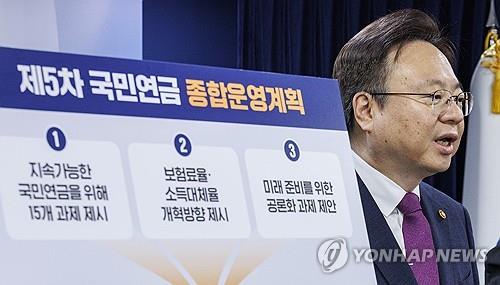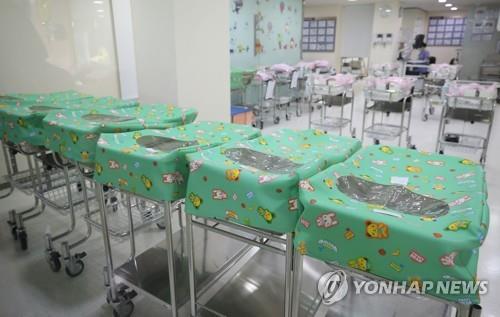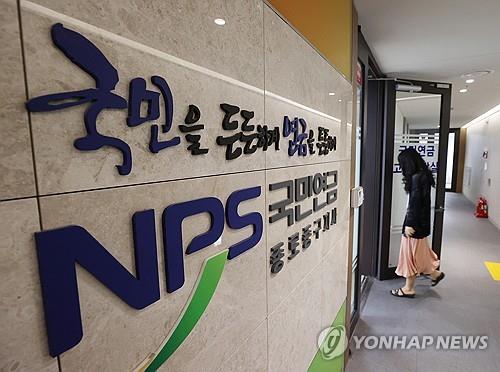- California Assembly OKs highest minimum wage in nation
- S. Korea unveils first graphic cigarette warnings
- US joins with South Korea, Japan in bid to deter North Korea
- LPGA golfer Chun In-gee finally back in action
- S. Korea won’t be top seed in final World Cup qualification round
- US men’s soccer misses 2nd straight Olympics
- US back on track in qualifying with 4-0 win over Guatemala
- High-intensity workout injuries spawn cottage industry
- CDC expands range of Zika mosquitoes into parts of Northeast
- Who knew? ‘The Walking Dead’ is helping families connect
Gov’t calls for ‘gradual increase’ in nat’l pension premium rate
The government on Friday announced a plan to “gradually” raise the national pension premium rate as part of efforts to improve the financial soundness of the system amid population aging, but stopped short of presenting detailed reform measures.
Revamping the national pension system is one of President Yoon Suk Yeol’s key agenda items on deepening concerns that the state-run pension fund could dry up faster than expected due to rapid aging.
The state-run National Pension Service said earlier that the fund is forecast to be depleted in 2055 after posting a shortfall starting in 2041.
Under the comprehensive plan on pension management, the Ministry of Health and Welfare said the gradual hike in the pension premium rate is “inevitable” to ensure the sustainability of the program, and vowed to push to differentiate the increase rate among age groups to ensure fairness.
The ministry noted that South Korea’s rate comes to just half the level set by member nations of the Organization for Economic Cooperation and Development, and it will review “the proper level in consideration of drastic demographic changes” without specifying details.

The proposal also did not specify the potential adjustment of the nominal income replacement rate by simply saying that related discussions will continue in line with the reform path.
The rate sets the amount of receivable pension after retirement, and some have called for its increase so as to allow people to receive more.
The ministry called for reviewing the further delay of the age that retirees receive payouts, which would be possible after the country secures “better conditions regarding the employment of senior citizens.”
Currently, the entitlement age of the benefit is set at 63, and is supposed to go up to 65 in 2033.
In an effort to alleviate concerns, particularly among young citizens, about the fund drawdown, the government vowed to push for enacting a law that would provide a government guarantee for pension payments due to people when they retire.
How to reform the national pension system has been a hot-button issue in South Korea, as the country is facing a demographic crisis due to its critically low birth rate.
The country’s total fertility rate — the average number of children a woman bears in her lifetime — came to a record low of around 0.7 this year.
It was much lower than the replacement level of 2.1 that would keep South Korea’s population stable at 51 million, according to government data.

According to the latest plan, the government, meanwhile, will raise the monthly basic pension benefit for senior citizens from the current 300,000 won to 400,000, which was one of the Yoon government’s policy goals.
But it did not deal with whether to revise the rules on eligibility.
The money is given to people aged 65 and older and who belong to the bottom 70 percent of the income distribution, and some have stressed the need to revise the criteria given the expected snowballing burdens as the benefit must be given to one out of every three South Koreans in 2050.
As for suggestions by some of using state coffers for pension finance, the ministry took a negative view and vowed to extend support for low-income and other vulnerable people.
The proposal will be submitted to the National Assembly by the end of this month following the deliberation of the Cabinet and approval by Yoon.
“The government will fix the details after gathering public opinions in cooperation with the parliamentary pension reform committee,” a ministry official said.
Last year, the National Assembly kicked off a special committee on pension reform.












